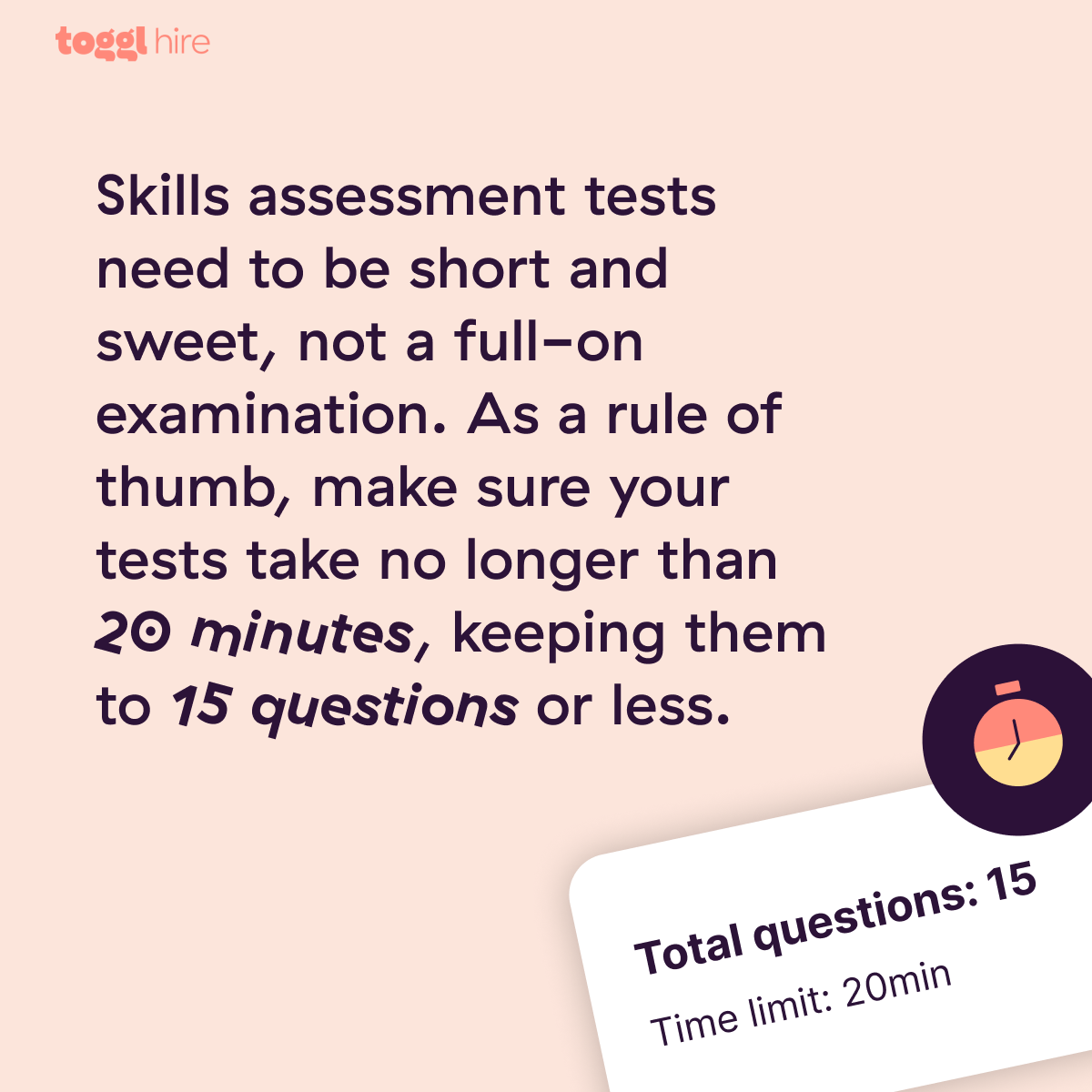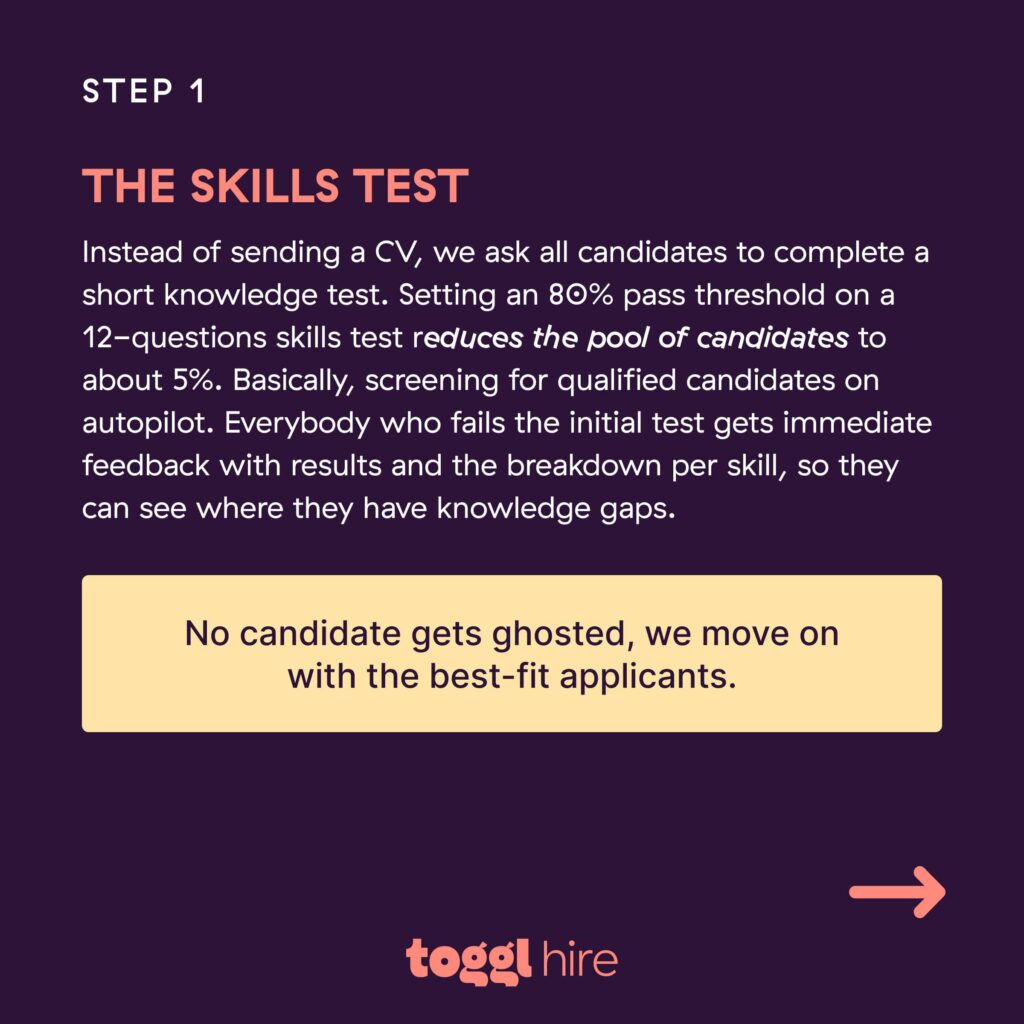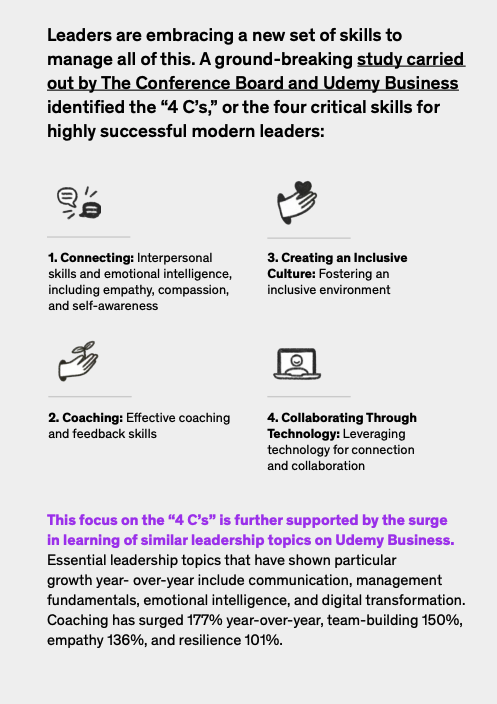Communication skills assessments should be like a “you need to be this tall to ride” checkpoint for every hire. Because communication plays a massive role (good and bad) in any business.
The proof? 80% of all workplace complaints and conflicts result from poor communication. And when communication doesn’t flow correctly across your organization, you can expect things to fall apart pretty quickly.
Now for the good news. When communication is top-notch, productivity can increase by up to 70%. After all, a key part of any job is discussing ideas, analyzing problems to find solutions, and collaborating with other people and teams within the organization.
So, next time you’ve narrowed down your list of top candidates to just three, and each candidate is near perfect in their regard, ask yourself, “Can they communicate effectively within all aspects of the business?”
A quick communication skills assessment can answer this question stress-free and avoid the risk and expense of making a bad hire. With all this in mind, let’s explore why communication skills are critical to any hire and how best to use communication skills assessments during your hiring process.
TL;DR—Key Takeaways
- Communication skills are a must-have for any productive team, especially with the rise of cross-functional teams, remote work, and digital interactions.
- Communication tests measure how well a candidate conveys ideas and interacts with others. Tip: active listening is important, too!
- While assessments are effective, there are biases and challenges to mitigate.
- Written, asynchronous, verbal, and strategic business communication, along with active listening, are the most important communication skills to measure.
- Toggl Hire measures candidates’ communication skills thanks to async video interviews, customizable test templates, and data-driven insights.
Want to try a soft skills assessment tool for free?
Sign up for a free Toggl Hire account and enjoy a two-week trial of our Premium plan!

Communication skills are more important than ever
In recent years, the business landscape has gone through a massive transformation, making communication skills a must-have power skill rather than a nice-to-have. Remote work and cross-functional teams are both on the rise, which means teams rely increasingly on digital interactions. Written, verbal, and asynchronous communication abilities are at an all-time high, along with other soft skills.
And when your communication is poor, it can lead to all sorts of headaches….like misunderstandings that derail projects, reduced productivity as teams struggle to stay on the same page, and even customer dissatisfaction when messages get lost in translation.
Organizations must invest in their leaders, and their leaders must invest in their teams. Communication, management fundamentals, emotional intelligence, and digital transformation are all topics and in-demand skills that have shown growth year-over-year, according to Udemy’s 2024 Global Learning & Skills Trends Report.
What is a communication skills test?
Skills assessments are evaluations used to measure a candidate’s abilities in specific areas. Communication skills tests — either verbal, written, or non-verbal — assess how a candidate can convey ideas effectively and interact with others.
For example, verbal communication assessments might include role-playing a customer service interaction, while written tests could ask candidates to draft a professional email or fill out a questionnaire judging themselves.
Non-verbal communication tests might observe body language and facial expressions during a mock presentation or group discussion.
The challenges of assessing communication skills
As with any part of the hiring process, there are difficulties when testing various communication skills of candidates. It’s a complex process, prone to plenty of biases and other discouraging hurdles.
Cheating on written tests
The larger the company you hire for, the greater the chance you’ll use standardized testing procedures. Unfortunately, cheating is possible when it comes to written tests. Need to pass a certification or answer some multiple-choice questions on your online assessment? Your candidate can probably Google the answers in a matter of seconds.
The good thing about using an assessment library (like the one we’ve built at Toggl Hire) is it boasts many anti-cheating features. Not only are test questions rotated dynamically across every quiz, but there are also copy/paste and browser fingerprinting features in place to flag fishy behavior.
You’ll get accurate results in minutes.
Some candidates don’t thrive under pressure
Not everyone handles pressure well, and the hiring process is already a stressful adventure for most job seekers. After all, the applicant might not have applied for a role that requires them to give eloquent and robust answers at the drop of a hat. Always be wary of placing candidates in high-pressure situations — they can choose to go with another company.
Instead of subjecting candidates to hours-long tests, we suggest breaking the flow into smaller chunks. This approach requires lower time and energy investment from the candidates and helps you arrive at your candidate shortlist much faster. It also gives you time to provide each candidate with constructive feedback.
Check out our article on how to build a skills-based hiring flow for more practical tips.
Lack of objectivity
Evaluating communication skills is tough because it’s usually so subjective. One interviewer might think a candidate is clear and concise, while another might find them too wordy or unclear. This subjectivity gets even trickier depending on the situation.
For example, someone might ace a formal, structured interview — but feel out of their depth in a more relaxed, team-based setting. Naturally outgoing and friendly candidates might thrive in group discussions but struggle with one-on-ones.
Different communication styles and cultures also affect assessment outcomes. Some people are direct and to the point, while others are more nuanced. Factors like personality, upbringing, and professional background can all shape these styles. Those who didn’t grow up with English as a first language might have effective communication skills but struggle on these types of tests.
So, unconscious biases can creep in and impact the evaluator’s objectivity. To tackle these issues, mix up your assessment methods, set clear and consistent evaluation standards, and give your interviewers some cultural sensitivity training.
You’ll gain a more balanced and fair view of each candidate’s communication skills. And offset some of that inherent subjectivity.

The 5 key communication skills and how to assess them
Think about every job ad you’ve ever had to write or pour over during your own career-hunting journey. What do all those walls of text have in common? They (usually) all express a need for strong communication skills.
But communication skills can mean many things. What ability does the role actually require? Is it writing, speaking, active listening, strategic, or asynchronous communication? Or all of them?
Nailing down your job requirements leads to better-quality candidates, so don’t skip this step. Instead, get detailed!
1. Written communication skills ✅
Every role in the tech-driven age requires employees to have a firm grasp of written language. Of course, this doesn’t mean candidates need a Bachelor of Literature or know how to structure a Haiku. They just need to communicate effectively in most written mediums.
For example, more than ever, businesses are communicating through instant messaging (think Slack or Microsoft Teams), email, and internal wikis for knowledge sharing. In fact, many companies migrate away from email for internal communications and focus only on messaging programs and knowledge-sharing platforms like Notion or Slite.
Often, the requirement for excellent written communication skills is actually a proxy for being able to:
- Translate complex ideas into simple language
- Communicate clearly and concisely
- Connect the dots in writing
- Convey big ideas in a compelling way
- Capture the attention and imagination of the reader
The list goes on, but you get the idea — there’s a difference between being literate and a great communicator. Hiring someone with poor written communication skills can lead to misunderstandings and inefficiencies. And let’s face it, who wants a meeting that could’ve been a simple message? Build a team that gets this.
🧠 Go-to methods for written communication skills assessments:
If communication skills are super important for the job, the best way to assess them is with a custom communication skills test. Open-ended questions let candidates show off both their writing skills and how they consider and structure their arguments.
Can’t think of any good questions? Head to our test library to pick from 15,000+ expert-created questions and get going in minutes.
2. Verbal communication skills ✅
No matter how remote a role might be, chances are the candidate will need to be on team calls — especially during the interview process. They should summarize their specialties clearly, explain ideas to coworkers, and convey information succinctly without getting sidetracked into a 20-minute story that has nothing to do with the task.
Verbal communication skills are essential to roles in Customer Success, Customer Support, Sales, Leadership, and HR, where speaking eloquently is part of delivering quality work. But even roles that don’t demand top-notch verbal skills can benefit from people who can work well with different departments, jump into discussions, and express themselves professionally.
🧠 Go-to methods for verbal communication skills assessment:
Obviously, virtual or face-to-face interviews are the perfect way to evaluate candidates’ verbal skills. They’re also useful for non-verbal cues, like their body language and how well they maintain eye contact. Nothing gives you a better idea of how good of a communicator someone is than having a meaningful conversation.
But if it’s a key skill you want to screen early in the process, you can partially automate the step to save your hiring team from the inevitable bad-fit interviews. Opt for pre-recorded video interviews.
For example, Toggl Hire Video Intros enable you to select relevant questions from the library or add your own and run the first-touch interview at scale. Candidates have time to practice and do a few retakes before submitting their answers. Works for everyone!

3. Active listening ✅
People usually focus on speaking as the most important aspect of communication, but meaningful conversation is nearly impossible without great listening skills.
Any team member needs to understand what is being said by the rest of the business. Getting ideas across is impossible if the recipient zones out or doesn’t listen when spoken to. Active listening skills are critical when managing teams, dealing with customers, and building good interpersonal communication. Active listening is also a good indicator of emotional intelligence.
🧠 Go-to methods for active listening communication skills assessment:
Active listening and verbal communication skills go hand in hand. You need both to have a constructive discussion. That’s why live interviews are a great method for evaluating candidates‘ ability to listen and speak effectively. In practice, active listening skills look something like this:
- The candidate doesn’t shy away from clarifying what’s being said or asked
- The candidate doesn’t talk over other people
- The candidate asks pointy follow-up questions
- The candidate doesn’t jump to conclusions but aims to gather more information
- The candidate takes notes to retain information or maintain focus
- The candidate can effectively summarize what was discussed
Active listeners make for exceptional team members and even better leaders. That’s why active listening is a top leadership skill your company should definitely invest in. Leaders who actively listen understand their team’s needs and concerns and foster a culture of openness and trust. This means more collaborative decision-making and a team that feels valued.
4. Asynchronous communication ✅
Asynchronous communication is an exchange of information that happens not in real-time or, as the name suggests, “out of sync.” It can take any form — video messages, audio messages, written messages, or even visuals. With the world’s shift to remote work and distributed teams, asynchronous communication has taken a central stage.
The asynchronous communication skill set includes thinking independently in situations where information or feedback isn’t available in real-time. It relates strongly to one’s ability to be disciplined, manage their time effectively, and think critically.
In practical terms, asynchronous communication skills are required for giving structured written feedback, fleshing out ideas, documenting processes, and communicating with context.
🧠 Go-to methods for asynchronous communication skills assessment:
A homework assignment or paid project could be a swift way to assess candidates’ asynchronous communication skills. You’re looking for someone highly skilled and independent to thrive in an async-first workplace.
At Toggl Hire, we’ve created an asynchronous hiring flow that relies on a combination of a skills assessment, live interview, paid challenge, and final presentation to get the proof of competence before we hire. See the step-by-step explanation of pre-employment skills testing for more details.





5. Strategic business communication ✅
Can the interviewee communicate and understand roadmaps, business goals, and the importance of promoting the company? In business, it’s all about “seeing the bigger picture,” and it’s essential that employees—especially those in leadership roles speaking with stakeholders—can clearly convey where the company is headed and what its goals are.
🧠 Go-to methods for business communication skills assessment:
If you’re hiring a team lead or department head, business communication skills will be a key requirement. At this level, candidates expect a longer hiring process, so you should use the time to get to know each other better. Saying that, don’t go overboard with a 10-step assessment flow.
You can employ situational interviews to evaluate candidates’ interpersonal skills and abilities. Steal these 100 soft skills questions for your next interview. Or use a mini-paid project to quickly assess candidates’ technical and cultural fit.
How Toggl Hire can help you assess candidate communication skills
Toggl Hire is a comprehensive skills-first hiring tool that offers a wide range of assessments, including communication tests, to help hiring managers objectively evaluate candidates’ competencies in the recruitment process.
With customizable test templates, multimedia question formats like asynchronous video interviews, and data-driven insights down to the question level, Toggl Hire guarantees a thorough and fair assessment process. Our platform integrates seamlessly with your existing hiring workflows, improving your ability to identify top communicators and other skilled professionals.
To start using these powerful tools, create a free account today and use Toggl Hire’s communication skills test to find the best candidates for your team.
Michelle is an experienced freelance writer who loves applying research and creative storytelling to the content she creates. She writes about B2B SaaS software while also participating in conversations about other industries, such as the digital publishing landscape, sports, and travel.





